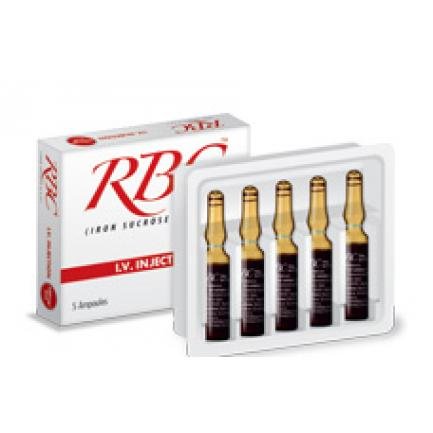delivery within 72 Hours
RBC 100mg Injection
₨ 1,950
Product Title: RBC 100MG INJECTION
Generic: Iron Sucrose
Pack Size: 5s
Product Form: INJECTION
Delivery within: 2 to 3 working days across Pakistan
Shipping & Delivery
-
Courier delivery
Our courier will deliver to the specified address
2-3 Days
From Rs 250
-
Free 15-Day returns

Black Friday Blowout!
Description
RBC 100mg Injection contains Iron Sucrose as its active ingredient. It is a type of intravenous iron therapy used to treat iron deficiency anemia when oral iron supplements are ineffective or cannot be tolerated. Iron Sucrose is a complex of iron and sucrose molecules that is administered directly into the bloodstream to replenish iron levels in the body. RBC injections are typically given under medical supervision in a clinical setting.
Uses:
- Iron Deficiency Anemia: RBC 100mg Injection is indicated for the treatment of iron deficiency anemia in patients who cannot adequately absorb oral iron supplements or have gastrointestinal conditions that prevent oral iron absorption.
- Chronic Kidney Disease: It may also be used in patients with chronic kidney disease undergoing hemodialysis who develop iron deficiency anemia due to blood loss during dialysis.
Administration:
RBC 100mg Injection is administered intravenously by a healthcare professional. The dosage and frequency of injections depend on the severity of the iron deficiency and the patient’s response to treatment. The injection should be given slowly over a period of time to minimize the risk of adverse reactions.
Side Effects:
Common side effects associated with RBC 100mg Injection may include:
- Nausea or vomiting
- Headache
- Dizziness
- Injection site reactions (such as pain, swelling, or redness)
- Hypotension (low blood pressure)
- Flushing or feeling of warmth
- Muscle cramps
Inform your healthcare provider if any side effects persist or worsen.
Precautions:
Before using RBC 100mg Injection, consider the following precautions:
- Inform your doctor about any existing medical conditions, especially kidney disease, liver disease, or allergies to iron or sucrose.
- Disclose all medications you are currently taking, including prescription drugs, over-the-counter medications, and herbal supplements, to avoid potential drug interactions.
- Monitor blood pressure during and after administration of RBC Injection, especially in patients with a history of hypertension or cardiovascular disease.
- Do not use RBC Injection in patients with known hypersensitivity to iron sucrose or any components of the injection.
When Not to Use:
RBC 100mg Injection should not be used in the following circumstances:
- Hypersensitivity: Individuals with a known allergy to iron sucrose or any components of the injection should avoid its use.
- Anemia Not Due to Iron Deficiency: Do not use RBC Injection in patients with anemia caused by conditions other than iron deficiency, unless iron supplementation is specifically indicated.
FAQs:
- How long does it take to see improvement in iron levels after receiving RBC Injection? Improvement in iron levels and symptoms of anemia may vary among individuals. Some patients may experience a response within a few weeks, while others may require multiple injections over several weeks to months.
- Are there any special precautions to follow after receiving RBC Injection? It is important to follow your healthcare provider’s instructions regarding dietary modifications or additional iron supplementation after receiving RBC Injection to optimize iron absorption and maintain iron levels.
- Can RBC Injection be used during pregnancy or breastfeeding? Pregnant or breastfeeding women should consult their doctor before using RBC Injection to assess the potential risks and benefits. Iron supplementation may be necessary during pregnancy or lactation to support maternal and fetal health.
- Can RBC Injection be administered at home? RBC Injection is typically administered in a clinical setting under medical supervision. Home administration may be considered in certain circumstances, but it requires proper training and supervision by healthcare professionals.
- What should I do if I miss a scheduled dose of RBC Injection? If you miss a scheduled dose, contact your healthcare provider to reschedule the appointment. Do not attempt to administer the injection yourself or double the dose to make up for the missed dose.
Customer Reviews
You must be logged in to post a review.










Reviews
Clear filtersThere are no reviews yet.